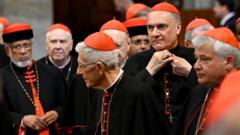While the U.S. administration reduces environmental support, international dialogue in Rome leads to significant discussions on biodiversity funding, with countries vying for a more equitable system.
Global Biodiversity Talks Yield Incremental Progress Amidst Challenges

Global Biodiversity Talks Yield Incremental Progress Amidst Challenges
In Rome, delegates at UN biodiversity discussions embrace a framework for tracking environmental commitments despite global political tensions.
The recent U.N. biodiversity talks in Rome marked a step forward amid a backdrop of political challenges and funding disputes, as countries grappled with unprecedented biodiversity losses. Following a global summit held in Colombia the previous year, representatives gathered in Rome to establish a framework aimed at monitoring environmental commitments and supporting nature conservation initiatives.
With the recent geopolitical landscape affecting negotiations, delegates worked meticulously to draft diplomatic texts while navigating contentious discussions. Notably, as the British government announced cuts to its overseas development aid and reductions in U.S. international assistance programs persisted, the urgency for cohesive action was apparent. “What we have achieved here is a beacon of hope,” remarked Colombia’s outgoing environment minister, Susana Muhamad, emphasizing the collective desire to prioritize environmental issues over national interests.
During the three-day dialogue, developing nations rich in biodiversity but facing economic disadvantages pushed for the creation of a new fund. This initiative aims to facilitate access to the proposed $200 billion annual target for nature funding by 2030. Countries in Africa and Latin America highlighted the existing challenges of obtaining multilateral monetary support, deeming their current access mechanisms as flawed. Conversely, opposition arose from donor nations concerned about the potential financial burden of establishing and managing such a fund, fearing it could siphon resources away from direct conservation efforts.
In the end, delegates reached a precarious agreement on a procedure for determining the establishment of the proposed fund, prompting applause within the conference room. The outcome symbolizes a delicate yet important compromise, showcasing the participants’ resolve to make strides toward enhancing biodiversity conservation initiatives worldwide.





















